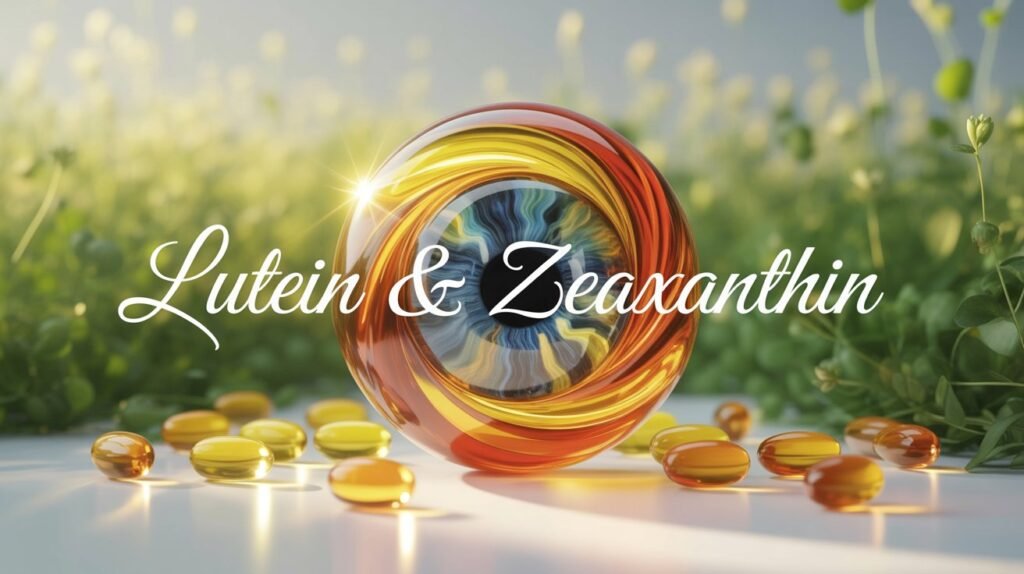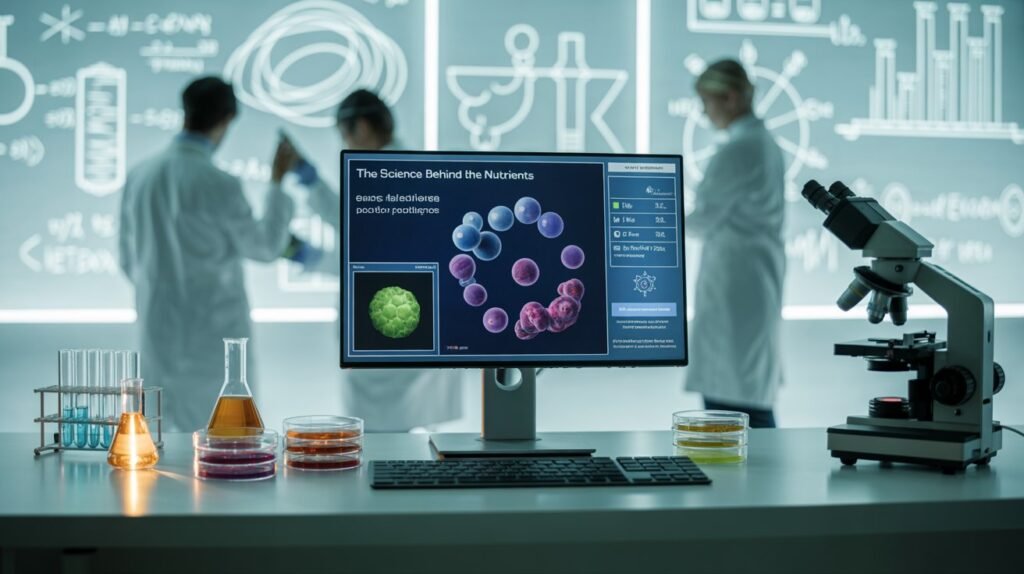Imagine a world slowly going out of focus, a favorite book grows harder to read, faces seem blurry, and the glow of a sunset fades. Millions face this reality as their eyes age or strain under daily screen time.
But what if there were simple nutrients that could help shield your eyes and bring back clarity? These “hidden heroes” are called lutein and zeaxanthin.

Most people haven’t heard about the protective powers of lutein and zeaxanthin for eye health. Yet these compounds could be the missing link in the battle against age-related eye diseases, future vision loss, and even day-to-day screen fatigue.
What Are Lutein & Zeaxanthin?
Lutein and zeaxanthin are two naturally occurring carotenoids, plant-based antioxidants found in leafy greens and bright yellow vegetables. In your body, lutein and zeaxanthin are concentrated in one special place: your eyes, particularly the macula and the retina.
Think of the macula as the “center stage” of your vision. This tiny spot, located at the back of your eye, is what lets you read words, drive, recognize faces, and see vivid colors. Lutein and zeaxanthin act as bodyguards here, shielding sensitive cells from dangerous light and damage.
How Lutein & Zeaxanthin Help Your Eyes
Numerous studies show lutein and zeaxanthin work as nature’s “built-in sunglasses” for the eyes.
They filter out harmful blue and ultraviolet light, absorbing and neutralizing this energy before it can damage photoreceptor cells.
Picture them defending your sight every time you step into sunlight or spend hours on screens.
But they do more than just block bad light! Lutein and zeaxanthin:
- Fight oxidative stress, which causes slow damage inside your eye tissues.
- Help maintain optimal macular pigment density, a key to sharp central vision.
- May reduce phototoxic damage and inflammation caused by strong light exposure or digital screens.
Fact: People who eat diets high in lutein and zeaxanthin regularly tend to have better night vision and less glare-related discomfort.
One study even showed that people eating spinach, kale, and broccoli are up to 50% less likely to develop cataracts, a leading cause of blindness worldwide.
The Science Behind the Nutrients
Recent research has ramped up attention on the role of lutein and zeaxanthin in eye health, especially for adults spending long hours on digital devices.

In 2025, a major clinical study revealed that daily supplementation with 10 mg of lutein and 2 mg of zeaxanthin led to measurable improvements in several eye health markers, especially for people using screens for six hours or more per day.
Here’s what the study found after six months:
- Increased tear production, less dry eye discomfort (Schirmer Tear Test)
- Improved tear film stability (Tear Film Break-Up Time)
- Faster recovery after light exposure (Photo-Stress Recovery Time). If you often struggle with dryness and irritation, explore these natural remedies for dry eyes for additional relief.
- Better overall resilience of the retina and macula
The nutrients were also found to be safe, with no serious adverse effects. This supports their growing use as a supplement for people struggling with screen-induced eye strain or modern lifestyle habits.
Fact: In the same study, there were no negative changes in vital signs or blood safety markers, confirming that lutein and zeaxanthin can be safely taken daily in recommended amounts.
Major Eye Diseases Addressed by Lutein & Zeaxanthin
Eye health concerns don’t just impact seniors. In today’s digital age, even teens and working professionals risk vision problems. As research expands, the focus has shifted to how lutein and zeaxanthin can help prevent or slow some of the most frustrating eye diseases:
- Age-related macular degeneration (AMD): Central vision fades, and reading becomes difficult. Lutein and zeaxanthin help build up the natural “pigment shield” in the macula, slowing disease progression. Along with these antioxidants, omega-3 fatty acids and AMD prevention have also been widely studied.
- Cataracts: Proteins in the lens break down, leading to cloudy sight. Regular intake of these nutrients reduces the risk and delays the onset of cataracts.
- Computer Vision Syndrome and Dry Eyes: Long hours on devices make eyes dry, red, and tired. Supplementation boosts tear production and stabilizes the tear film, offering real relief.
- Diabetic Retinopathy: Blood sugar swings can damage tiny blood vessels in the retina. Early evidence suggests lutein and zeaxanthin support retinal function and may reduce inflammation.
Dietary Sources: Getting Enough Lutein & Zeaxanthin
Nature has packed lutein and zeaxanthin in many delicious, everyday foods. Eating a rainbow of vegetables daily can supply nutrients for improved eye health. Here are the top foods:
- Kale (1 cup): 23.8 mg lutein/zeaxanthin
- Spinach (1 cup): 20.4 mg
- Collard greens (1 cup): 14.6 mg
- Turnip greens (1 cup): 12.2 mg
- Corn (1 cup): 2.2 mg
- Broccoli (1 cup): 1.6 mg
Fact: Just one cup of cooked kale supplies more than double the recommended amount of lutein for eye health. For a full list of foods rich in lutein and zeaxanthin for healthy eyes, check out our detailed guide.
Supplementation: Dosage, Safety & Scientific Evidence
Sometimes, eating lots of leafy greens and bright vegetables isn’t possible every day. That’s why lutein and zeaxanthin supplements have become popular, especially for people worried about their eye health or exposed to digital screens for long hours.
Recommended Dosage
Health experts and major studies suggest an ideal daily intake of lutein and zeaxanthin:
- 10 mg lutein
- 2 mg zeaxanthin
These amounts can usually be found together in many vision support supplements. Taking them together is important, as research shows combined supplements are more effective at increasing macular pigment density and improving overall eye protection compared to lutein alone.
Safety Profile
Clinical trials up to 2025 confirm that these nutrients are highly safe for most healthy adults. No serious side effects were seen, even with daily supplementation for many months. Some people may notice slight yellowing of the skin if they take very high amounts, but this is harmless and goes away if usage stops.
Supplementation Tips
Before buying, check labels for third-party testing and purity. Choose products listing both lutein and zeaxanthin, not “lutein only” For maximum absorption, take supplements with meals containing healthy fats, like olive oil or avocado.
Who Can Benefit Most?
While everyone wants healthy eyes, some people have special reasons to boost their lutein and zeaxanthin intake.
At-Risk Groups
- Seniors & Aging Adults: Eye diseases like macular degeneration and cataracts risk goes up with age. Starting lutein and zeaxanthin early can slow down age-related changes.
- Digital Screen Users: If working, studying, or gaming on screens over 6 hours daily, you may feel eye strain, dryness, and fatigue. Nutrient support offers relief and helps maintain productivity. To go further, read our complete guide on how to reduce digital eye strain symptoms naturally.
- People With Family History: If parents or grandparents battled vision loss or AMD, nutritional prevention becomes vital.
- Diabetics: Diabetes can harm small eye vessels. Supporting the retina with antioxidants may delay or prevent complications.
Everyone, children, adults, and seniors can benefit from adding eye-friendly foods to their plates or supplements to their routines.
Real Stories: Hope for Modern Eyes
Picture Priya, a college student glued to her laptop for online classes, worried about blurry vision and dry eyes. She started eating spinach omelets twice a week and taking an eye supplement with lutein and zeaxanthin.

Three months later, she noticed less glare from the screens, more comfortable late-night reading, and felt more energy in her eyes.
Or think about Mr. Singh, retired and nervous about developing cataracts just like his older brother. Adding kale smoothies to his breakfast and a daily supplement helped him pass his vision test with brighter, clearer sight. These aren’t medical miracles, just proof that small changes in eating habits can create a big impact over time.
Common Questions: FAQs about Lutein & Zeaxanthin
Q1: Can these nutrients really improve vision?
Lutein and zeaxanthin don’t make eyesight “perfect” but help protect against damage, improve clarity, and maintain sharpness. Results often show within three to six months of regular use, especially in people with existing eye strain or low nutrient intake.
Q2: Are there any side effects?
Most people tolerate lutein and zeaxanthin very well. In rare cases, taking extra-high doses may cause a harmless yellow tint in the skin, but no serious risks are reported in studies.
Q3: Do I need supplements if I eat plenty of vegetables?
Supplements are helpful for people with limited access to fresh produce, busy lifestyles, or increased risk of eye disease. But eating colored vegetables should always be the first line of defense for vision health.
Q4: How can I include more in my diet?
Easy ways: Toss spinach into pasta, add kale to salads, blend collard greens in smoothies, and use corn and broccoli as side dishes. Diverse eating makes getting the recommended intake easy and delicious!
Q5: Who should check with a doctor before taking supplements?
Pregnant women, nursing mothers, and people taking medicines for chronic diseases should talk to healthcare professionals before starting supplements.
Conclusion: Protect Your Precious Gift
Every morning, eyes open to new possibilities, a smile, a sunrise, laughter, and learning. But the modern world is hostile to healthy vision, with screens, sunlight, and stress all working against us.
The role of lutein and zeaxanthin in eye health is supported by science, simple eating wisdom, and real results from everyday lives. By caring for eyes now with smart nutrition and habits, clearer vision becomes a lifelong gift.
Don’t wait until problems appear. Start today. Fill your plate with kale, spinach, corn, and bright veggies. Add a quality eye supplement if needed. Protect your sight so the beauty of this world stays vivid and clear, for you and everyone you love.